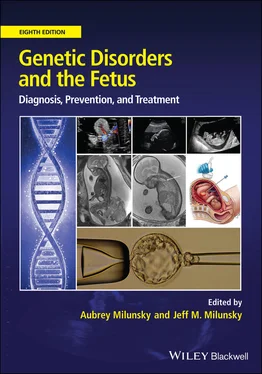Genetic Disorders and the Fetus
Здесь есть возможность читать онлайн «Genetic Disorders and the Fetus» — ознакомительный отрывок электронной книги совершенно бесплатно, а после прочтения отрывка купить полную версию. В некоторых случаях можно слушать аудио, скачать через торрент в формате fb2 и присутствует краткое содержание. Жанр: unrecognised, на английском языке. Описание произведения, (предисловие) а так же отзывы посетителей доступны на портале библиотеки ЛибКат.
- Название:Genetic Disorders and the Fetus
- Автор:
- Жанр:
- Год:неизвестен
- ISBN:нет данных
- Рейтинг книги:4 / 5. Голосов: 1
-
Избранное:Добавить в избранное
- Отзывы:
-
Ваша оценка:
- 80
- 1
- 2
- 3
- 4
- 5
Genetic Disorders and the Fetus: краткое содержание, описание и аннотация
Предлагаем к чтению аннотацию, описание, краткое содержание или предисловие (зависит от того, что написал сам автор книги «Genetic Disorders and the Fetus»). Если вы не нашли необходимую информацию о книге — напишите в комментариях, мы постараемся отыскать её.
Genetic Disorders and the Fetus — читать онлайн ознакомительный отрывок
Ниже представлен текст книги, разбитый по страницам. Система сохранения места последней прочитанной страницы, позволяет с удобством читать онлайн бесплатно книгу «Genetic Disorders and the Fetus», без необходимости каждый раз заново искать на чём Вы остановились. Поставьте закладку, и сможете в любой момент перейти на страницу, на которой закончили чтение.
Интервал:
Закладка:
Michie et al. 270studied nondirectiveness in genetic counseling. They defined directiveness as advice and expressed views about or selective reinforcement of counselees' behavior, thoughts, or emotions. As expected, they concluded that genetic counseling as currently practiced was not characterized, either by counselors, counselees, or a standardized rating scale they used, as uniformly nondirective.
Clarke 271remarkably argued that nondirective genetic counseling in the context of prenatal diagnosis is “inevitably a sham,” largely because of the “structure of the encounter between counselor and client.” He further contended “that an offer of prenatal diagnosis implies a recommendation to accept that offer, which in turn entails a tacit recommendation to terminate a pregnancy” if the fetus is abnormal. In 1970 272it was emphasized that the offer of prenatal diagnosis was not associated with any explicit or implicit commitment to abort. Clarke 271further opined that “nondirective counseling was unattainable, despite the counselor's motives, since the offer and acceptance of genetic counseling has already set up a likely chain of events in everyone's mind.” Experienced clinical geneticists were taken aback by his views, 273 – 275and rightly so. He regarded reproductive choice as part of the “1980s consumerism model of clinical genetics.” 276The personal values of geneticists/counselors may influence behavior in clinical practice and individual vigilance is necessary to abide by the nondirective principle. This may be less challenging than imagined given the reported highly valued benevolence, self‐direction, and pattern of concern for the welfare of others. 276Clarke ignored a fundamental tenet of genetic counseling founded in a free society, where choice is not a fad but a right. His ideas suggest contempt for the views (and hence choices) of the public, maintaining that respect for the handicapped is not achievable in a society that “makes judgments about what types of people are worthy of life.” 276Others have reported that people's decision‐making processes are more rational than they might appear to be. 277Simms 278noted that, with hindsight, 80 percent of parents with handicapped children would have aborted their pregnancies. Later, in taking Clarke to task, she concluded that it was “his professional duty to advise parents to the best of his ability, not to make decisions for them. They will have to live with the consequences: he will not.” 279
The intrinsic danger of using a directive approach is the opportunity (even subconscious or inadvertent) for the physician/counselor to insinuate his or her own religious, racial, eugenic, or other beliefs or dictates of conscience into the counseling that is offered. 280A breach of this principle, supported by some, 281invites the provider to visit upon the patient unwarranted conscious or subliminal prejudices. Some obstetricians, for example, are known to have specifically not offered or referred patients for prenatal genetic studies because of their antiabortion views and have unconscionably exaggerated the specific risks of amniocentesis in order to discourage prenatal genetic studies. A Mexican study showed that physicians in specialties other than clinical genetics tend to counsel directively. 282
The duty of the physician and genetic counselor is to communicate all the available information and then to assist a counselee to recognize his or her major priorities, beliefs, fears, and other concerns in order to make possible the counselee's rational decision making. To remain impartial is difficult and takes valuable time and conscious effort, but it is largely attainable. Time‐pressed nongeneticists providing genetic counseling may easily experience slippage between choice and coercion. 283 , 284The difficulty lies mainly in trying to remain impartial while aiming to prevent the occurrence of genetic disease. Personality characteristics of the counselor may well influence the counseling provided. 285The optimistic counselor may unwittingly color the texture of counseling provided in contrast to the depressed counselor. Hsia 286validly observed that optimistic counselors may tell anxious individuals not to worry, whereas pessimistic ones might unwittingly exaggerate the significance of even small risks. The insinuation of the physician's prejudices into the decision‐making process of the counselee constitutes a moral affront to individual privacy and reproductive autonomy. 287
In rare instances, family circumstances may challenge the need to adhere to personal autonomy and nondirective counseling. The right of one monozygous twin at 50 percent risk for Huntington disease not to know information after predictive testing should be respected. If there is possible harm to the co‐twin, Chapman suggested that testing should “be denied in the absence of mutual consent.” 288She further argued that in the interest of beneficence, directive counseling is acceptable for individuals at 50 percent risk of Huntington disease who suffer from depression, lack social support, and have a history of attempted suicide. For these patients, psychiatric evaluation and counseling, rather than predictive testing, have been recommended. In a 15‐year experience offering predictive counseling for Huntington disease, the Canadian authors emphasized the importance of preparation for receiving test results. 289In a study of counseling following prenatal diagnosis of Klinefelter syndrome, Marteau et al. 290found that pregnancy was almost two‐and‐a‐half times more likely to continue when counseling was provided by a geneticist.
Ever‐increasing genetic testing using microarrays and whole‐exome sequencing introduced the counseling challenge following determination of secondary findings. This issue of possible genomic uncertainty should be addressed prior to any sample being obtained. The American College of Medical Genetics and Genomics (ACMG) have a list of 59 actionable disorders which geneticists are directed to communicate because of potential health and life‐saving opportunities (see Chapter 14). Patients may opt out of this potential directive counseling, and clearly have the right not to know. 291More difficult, however, are discoveries of variants of uncertain or unknown significance (VOUS) (see Chapter 14). Recognition, for example, in a newborn with epileptic encephalopathy, macrosomia, hypotonia, hypoglycemia, and dysmorphic facies of unknown compound heterozygous, instead of known homozygous mutations 292in the HERC1 gene, would pose a serious challenge to remain nondirective regarding future recurrence risks and options. Further complicating nondirectiveness is the realization that pathogenic variants may occur in disease‐free individuals. 293
Fortunately, it is very uncommon to have two parents with totally opposing views regarding the option of an abortion of an affected fetus. A counseling experience with a couple, both of whom were FBI agents, brought this issue into stark relief. The emotional exchange and the vested positions of the parties invited the “nondirective directive” to return home for their decision making while ensuring that they were in the possession of all necessary facts upon which rationality could trump.
Incidental detection by ultrasound, for example, of a hypoplastic thymus, 294following a maternal‐age indicated amniocentesis of a 22q11.2 deletion provides another quandary when one parent with a few signs is found to harbor the same microdeletion. Certainty about the future phenotype would be unwise, 295with the discussion about pregnancy termination requiring definitive nondirectiveness.
Concern for the individual
The ethical principles of beneficence, respect for autonomy, non‐maleficence, and justice (see Chapter 37) underscore the approach to all patients. They are the focus of our concern, not the interests of the state. Although germs and genes occupy the province of the public health authorities, genetic privacy is paramount. This attitude permeates the genetic counseling encounter where many challenging issues will be raised, including the frequent controversial issue of abortion.
Читать дальшеИнтервал:
Закладка:
Похожие книги на «Genetic Disorders and the Fetus»
Представляем Вашему вниманию похожие книги на «Genetic Disorders and the Fetus» списком для выбора. Мы отобрали схожую по названию и смыслу литературу в надежде предоставить читателям больше вариантов отыскать новые, интересные, ещё непрочитанные произведения.
Обсуждение, отзывы о книге «Genetic Disorders and the Fetus» и просто собственные мнения читателей. Оставьте ваши комментарии, напишите, что Вы думаете о произведении, его смысле или главных героях. Укажите что конкретно понравилось, а что нет, и почему Вы так считаете.












